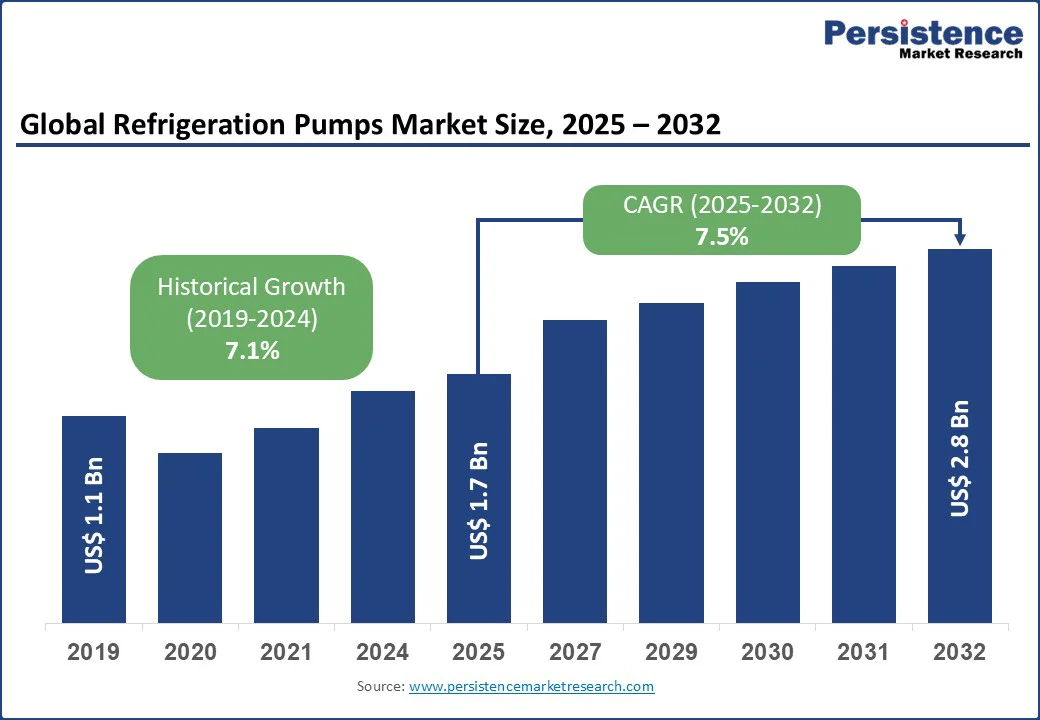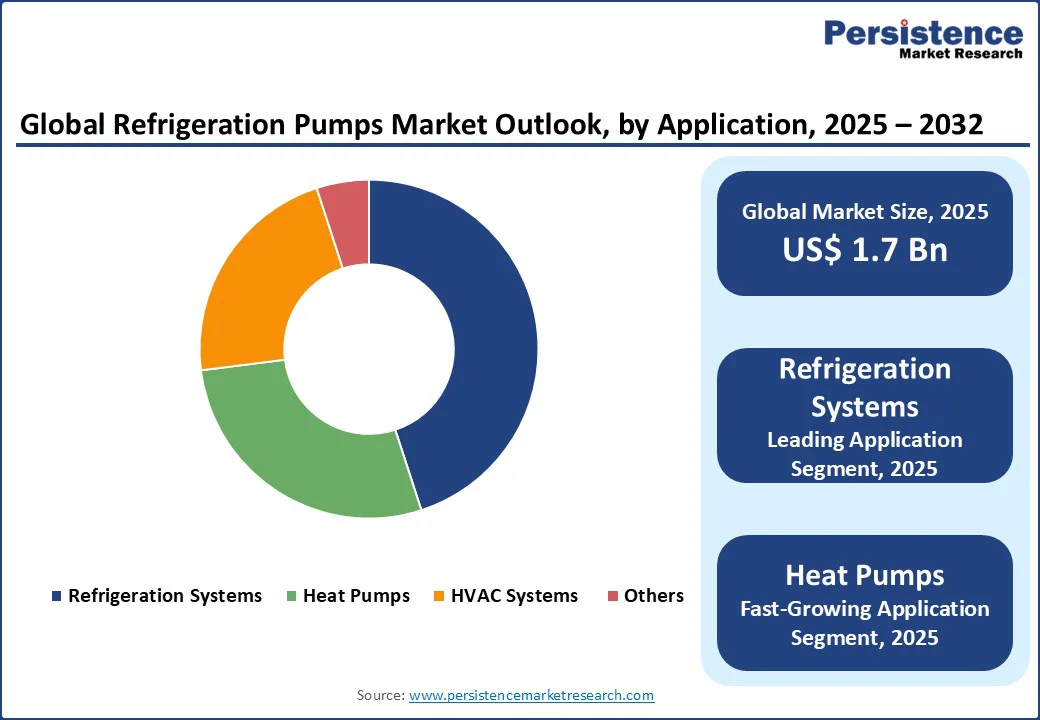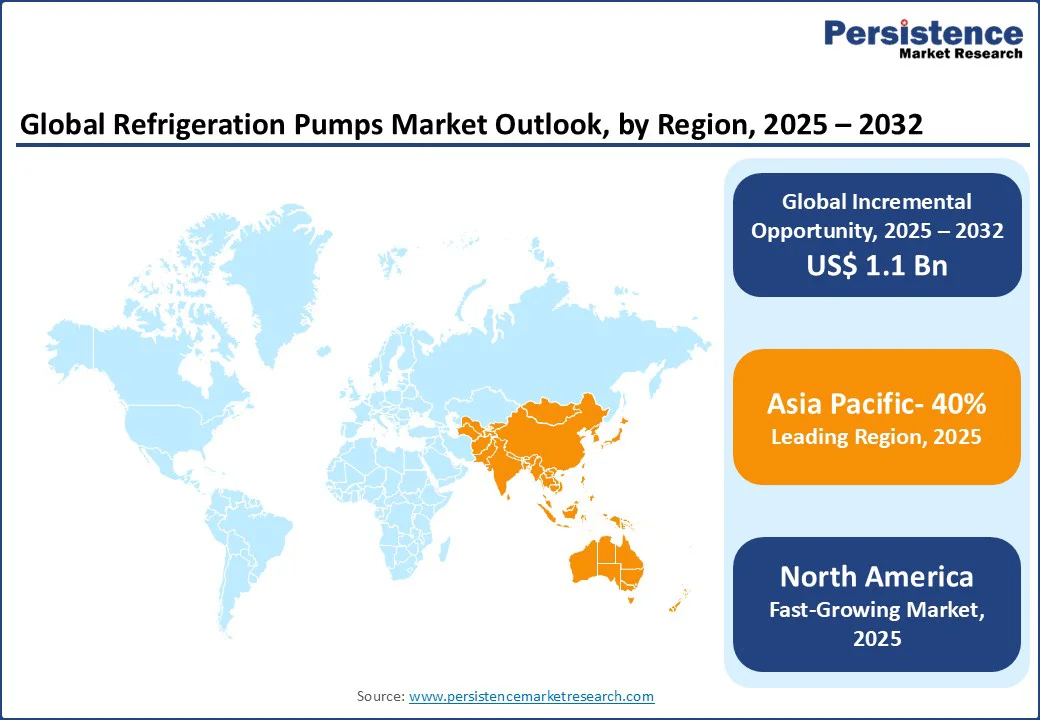ID: PMRREP11221| 187 Pages | 25 Sep 2025 | Format: PDF, Excel, PPT* | Industrial Automation

The global refrigeration pumps market size is likely to be valued at US$1.7 bn in 2025 and is expected to reach US$2.8 bn by 2032, growing at a CAGR of 7.5% during the forecast period from 2025 to 2032.
The major growth factor is the rising demand for energy-efficient and reliable cooling solutions across industrial, commercial, and cold chain sectors.
| Key Insights | Details |
|---|---|
| Refrigeration Pumps Market Size (2025E) | US$1.7 Bn |
| Market Value Forecast (2032F) | US$2.8 Bn |
| Projected Growth (CAGR 2025 to 2032) | 7.5% |
| Historical Market Growth (CAGR 2019 to 2024) | 7.1% |

The growing need for energy-efficient cooling systems is a key driver in the refrigeration pumps market. Rapid urbanization and rising temperatures across regions have significantly increased demand for cooling solutions in residential, commercial, and industrial sectors.
This surge has resulted in higher energy consumption, encouraging the adoption of energy-efficient technologies to reduce operational costs and environmental impact. Refrigeration pumps, as core components of cooling systems, play a vital role in improving system efficiency, ensuring sustainable performance, and supporting long-term energy savings.
Government initiatives further reinforce this trend by promoting energy-efficient technologies. For instance, India’s Bureau of Energy Efficiency (BEE) has implemented the Perform, Achieve, and Trade (PAT) Scheme, which sets energy efficiency targets for large industries and incentivizes the adoption of efficient equipment, including refrigeration pumps.
By encouraging industries to upgrade to advanced, energy-efficient cooling systems, such initiatives help reduce energy consumption, lower operational costs, and accelerate the growth for refrigeration pumps.
High initial costs pose a significant restraint to the growth of the refrigeration pumps market. Advanced refrigeration pumps designed for energy efficiency and high performance require substantial upfront investment, which can deter small and medium-sized enterprises from adopting these technologies.
The cost factor becomes more critical in regions with price-sensitive markets, limiting widespread adoption despite the long-term benefits of energy savings and operational efficiency.
Maintenance challenges further restrict market growth. Refrigeration pumps involve complex components that require regular inspection, specialized knowledge, and timely servicing to ensure optimal performance. Improper maintenance can lead to reduced efficiency, frequent breakdowns, and higher operational costs, making potential buyers cautious. Together, these financial and technical barriers act as key restraints.
The expansion of cold chain logistics presents a significant opportunity for the refrigeration pumps market. Increasing demand for temperature-sensitive products such as pharmaceuticals, perishable food, and frozen goods has accelerated the development of advanced cold storage and transportation systems.
Efficient refrigeration pumps are critical to maintaining precise temperature control, ensuring product quality, and minimizing energy consumption, making them indispensable in modern cold chain infrastructure.
Similarly, the adoption of smart HVAC systems is driving market growth. Integration of IoT-enabled sensors, automation, and energy management technologies allows for optimized performance, predictive maintenance, and reduced operational costs.
These intelligent systems rely on high-performance refrigeration pumps to achieve consistent cooling, enhance energy efficiency, and support sustainable building management, creating lucrative opportunities for manufacturers and suppliers.
Centrifugal pumps are expected to dominate the refrigeration pumps market in 2025, holding a 50% market share. Their widespread adoption is attributed to high efficiency, robust design, and suitability for large-scale industrial and commercial cooling systems.
These pumps are capable of handling substantial flow rates and maintaining consistent performance, making them ideal for HVAC systems, cold storage, and industrial refrigeration applications. Their reliability and relatively low maintenance requirements further reinforce their dominance.
On the other hand, scroll pumps are emerging as the fastest-growing segment in the refrigeration pumps market. Their compact design, energy efficiency, and quieter operation make them increasingly preferred in residential and small commercial applications. Advancements in scroll pump technology, coupled with the rising demand for energy-efficient and low-noise cooling systems, are driving rapid adoption, positioning them as a key growth area for manufacturers in the coming years.
In 2025, large-capacity refrigeration pumps exceeding 20 tons are expected to dominate, capturing a 40% share. These pumps are widely used in industrial facilities, large commercial complexes, and centralized HVAC systems due to their ability to handle high cooling loads efficiently. Their robust performance, durability, and capability to maintain consistent temperature control make them a preferred choice for large-scale applications.
Meanwhile, medium-capacity pumps ranging from 5 to 20 tons are emerging as the fastest-growing segment. Driven by increasing demand from small and mid-sized commercial buildings, data centers, and urban infrastructure, these pumps offer a balance between efficiency and cost-effectiveness. Advancements in energy-efficient designs and the growing adoption of smart cooling systems are accelerating the growth of medium-capacity refrigeration pumps, making them a key opportunity area for market players.
Refrigeration systems are projected to dominate, holding a 45% market share. Their extensive use across industrial, commercial, and food storage applications is driven by the need for reliable and consistent cooling. These systems rely heavily on high-performance refrigeration pumps to maintain precise temperature control, improve energy efficiency, and ensure the quality of perishable goods. The combination of proven technology, durability, and adaptability across diverse sectors reinforces the dominance of refrigeration systems.
Conversely, heat pumps are emerging as the fastest-growing segment. Increasing adoption in residential and commercial buildings, along with their dual functionality for heating and cooling, is fueling market growth. Integration with smart HVAC systems and energy-efficient technologies enhances performance and reduces operational costs, making heat pumps an attractive and rapidly expanding application area for refrigeration pumps.
In 2025, the industrial sector is expected to dominate the refrigeration pumps market, capturing a 40% share. High demand from manufacturing plants, chemical processing facilities, and large-scale commercial establishments drives this dominance. Industrial applications require robust and reliable refrigeration pumps to maintain consistent cooling, optimize energy efficiency, and support uninterrupted operations, making them a critical component of large-scale systems.
Meanwhile, the agricultural sector is emerging as the fastest-growing end-use segment. Rising adoption of cold storage solutions for fruits, vegetables, dairy, and other perishable products is fueling demand. Energy-efficient refrigeration pumps are crucial for preserving produce quality, reducing post-harvest losses, and enabling year-round storage. Technological advancements in agricultural cooling systems are further accelerating growth, creating significant opportunities for market players in this segment.

North America is emerging as the fastest-growing region in the refrigeration pumps market, driven by rising demand for energy-efficient cooling systems across commercial, industrial, and residential sectors. The growth of smart HVAC systems, expansion of cold chain logistics for pharmaceuticals and food, and stringent energy-efficiency regulations are fueling market adoption.
Additionally, increasing industrialization and urbanization, coupled with technological advancements in pump design, are enhancing system performance and reducing operational costs. Supportive government policies and incentives for sustainable cooling solutions further accelerate market growth, making North America a key region for refrigeration pump manufacturers and technology innovators.
Europe holds a significant share in the refrigeration pumps market, driven by the region’s focus on energy-efficient cooling solutions and advanced industrial infrastructure. Strong adoption of sustainable technologies in commercial, industrial, and residential sectors supports steady demand for high-performance refrigeration pumps.
The presence of stringent regulations, such as the European Union’s Ecodesign Directive, encourages the use of energy-efficient systems, further boosting market penetration. Additionally, Europe’s well-established cold chain logistics, growing food and pharmaceutical industries, and increasing investments in smart HVAC and refrigeration technologies reinforce its position as a key market, making it an attractive region for manufacturers and technology providers.
Asia Pacific is expected to dominate the refrigeration pumps market in 2025, holding a 40% share. Rapid industrialization, urbanization, and expanding commercial infrastructure are driving the region’s demand for efficient cooling solutions. The growing food processing, pharmaceutical, and cold chain logistics sectors further fuel the adoption of high-performance refrigeration pumps.
Additionally, rising awareness of energy efficiency and government initiatives promoting sustainable cooling technologies are supporting market growth. Emerging economies such as China and India are investing heavily in smart HVAC systems and large-scale refrigeration projects, reinforcing Asia Pacific’s position as the leading market for refrigeration pumps globally.

The global refrigeration pumps market is highly competitive, characterized by continuous technological innovation and strategic expansions. Companies are focusing on developing energy-efficient, high-performance pumps to cater to the growing demand across industrial, commercial, and residential sectors. Key strategies include product launches, partnerships, and regional expansions to strengthen market presence.
Continuous R&D investments aimed at enhancing efficiency, reducing noise, and supporting smart HVAC integration are driving differentiation. The competitive environment encourages innovation, enabling manufacturers to meet evolving market demands and regulatory requirements effectively.
The refrigeration pumps market is projected to reach US$1.7 bn in 2025, driven by demand for energy-efficient cooling systems.
Rising demand for energy-efficient HVAC systems, stringent environmental regulations, and cold chain logistics growth fuel the industry
The refrigeration pumps market will grow from US$1.7 bn in 2025 to US$2.8 bn by 2032, with a CAGR of 7.5%.
Expansion in cold chain logistics and smart HVAC systems, particularly in emerging markets, drives growth opportunities.
Leading players include Hermetic Pumps, Coell Pump, Kirloskar Brothers, IDEX Corporation, Chempump, Buffalo Pumps, and Haskel.
| Report Attribute | Details |
|---|---|
| Historical Data/Actuals | 2019 - 2024 |
| Forecast Period | 2025 - 2032 |
| Market Analysis | Value: US$ Bn, Volume: As Applicable |
| Geographical Coverage |
|
| Segmental Coverage |
|
| Competitive Analysis |
|
| Report Highlights |
|
By Pump Type
By Capacity
By Application
By End-use
By Region
Delivery Timelines
For more information on this report and its delivery timelines please get in touch with our sales team.
About Author